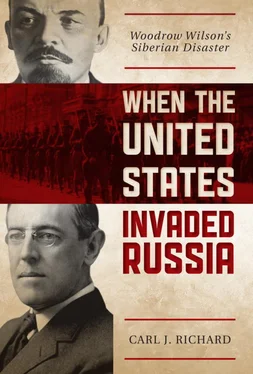It is true that Wilson established an early aversion to the Bolsheviks, but this was as much a product of circumstances as of ideological differences. The first major action taken by the Soviet government on assuming power was its call for a general armistice between the Allies and the Central Powers, something the Allies could not support while the Central Powers occupied most of Europe. This Bolshevik declaration came at a particularly inopportune time for Wilson, who was engaged in an intense struggle with domestic pacifists for popular support. Indeed, in his first speech after the Bolshevik Revolution with any reference to Russia, Wilson warned against those “as fatuous as the dreamers of Russia” who advocated a premature peace that would leave Germany in a threatening position. Wilson’s Fourteen Points Speech of January 1918 was largely an attempt to counter the Bolshevik call for a general armistice. In that speech Wilson praised the Bolsheviks’ peace terms so that he might criticize the Germans for rejecting them. The following month Wilson found “an unusual amount of truth” in a memorandum written by Samuel Gompers, the leader of the American Federation of Labor, and pro-war socialist William English Walling that warned of a combination of “war weariness” and “Utopian dreams fanned into new life by the Russian revolution” that might lead to crippling strikes not only in Europe but even among immigrant workers in the United States. Coming at the height of World War I, such strikes might very well cost the Allies the war. Secretary of State Lansing agreed with this assessment. Indeed, the Wilson administration was so alarmed by the potential effects of opposition to the war that its officials began rigorously enforcing the Espionage Act of 1917, a law that essentially criminalized such opposition, after the Bolshevik Revolution. [38] Ray Stannard Baker and William E. Dodd, eds., The Public Papers of Woodrow Wilson (New York: Harper, 1925–1927), Speech to the American Federation of Labor, November 27, 1917, vol. 5, 120; Fourteen Points Speech, January 1918, vol. 5, 155–62; Link, Papers of Woodrow Wilson , Chief Danger of Revolutions and Revolutionary Movements in Eastern Europe: Revolutionary Movements in Western Europe, February 9, 1918, vol. 46, 310–13; Wilson to Robert Lansing, February 13, 1918, vol. 46, 334; Robert Lansing to Wilson, February 15, 1918, vol. 46, 349–50; Robert K. Murray, Red Scare: A Study of National Hysteria, 1919–1920 (New York: McGraw-Hill, 1955), 13, 22–32.
But the public relations problem that the Bolsheviks had caused Wilson was only the tip of the iceberg. In Wilson’s mind, the principal effect of the Bolshevik Revolution was that there would no longer be a large Russian army tying down German divisions in the East. While it is true that the collapse of the Russian army began before the Bolsheviks seized power, it is also true that as long as the Provisional Government remained in power and at war, there had at least been some hope of the revival of Russian armed forces, which is why the Germans were unwilling to transfer their eastern divisions to the Western Front until Russia formally withdrew from the war. Lansing estimated that the Bolshevik withdrawal of Russia from the war would add two or three years to it and cost the United States alone hundreds of thousands of lives and billions of dollars. The withdrawal of Russia from the war inevitably caused great bitterness toward the Bolsheviks among the Allies. Lloyd George described the Allied feeling toward the Bolsheviks well when he wrote, “It was not merely their atrocities that excited resentment, but their abandonment of the Allied cause at a critical stage in the struggle. This betrayal very nearly precipitated an irreparable disaster in the spring and summer of 1918. As France had gone into the war to back up Russia when she was attacked, French statesmen regarded the Treaty of Brest-Litovsk as an act of perfidy.” Leaving aside the highly dubious nature of this interpretation of the war’s origin, the feeling of betrayal Lloyd George described was certainly real. Lansing wrote: “Those who today claim to represent the [Russian] nation threaten to violate treaties made with other free peoples, to make friends with the most inveterate enemy of Russian aspirations, and to abandon the faithful friends of Russia in the great struggle against the Prussian autocracy. In light of this program, so contrary to democratic ideas of honor and duty, it cannot be that the Bolshevik leaders represent the Russian people or express their true will.” Added to this bitterness was the concern felt at the time that, whatever the Bolsheviks’ intentions, the chief result of the Bolshevik Revolution might be to open up Russia for German exploitation. As Lloyd George recalled, “It was apprehended that the destructive working of Bolshevism might in fact prove merely to have broken up and ploughed a field in readiness for planting with Prussianism.” In addition to the other troubling ramifications of the treaty, the Allies feared that German control of the Ukraine, which had long been the breadbasket of Europe, might in itself be sufficient to negate the crucial effects of the Allied blockade of Germany. [39] Link, Papers of Woodrow Wilson , Statement by Robert Lansing, December 4, 1917, vol. 45, 206; Robert Lansing to Woodrow Wilson, December 10, 1917, vol. 45, 264; David Lloyd George, Memoirs of the Peace Conference (Boston: Little, Brown, 1939), vol. 1, 213; vol. 6, 149.
If, then, the Bolsheviks made a very poor impression on Wilson early in his experience with them, they did not improve matters on February 10, 1918, when they repudiated all debts to the Allies incurred by previous Russian governments. As in the case of their withdrawal from the war, this action was understandable from the Bolshevik point of view. Given the economic state of Russia at the time, it would have been extremely difficult for any government to have repaid Russia’s war debt. But this repudiation of debt cost the United States $187,729,750 (the portion of the $350 million in American aid allotted to the Provisional Government that had already been disbursed) and cost the other Allied governments, already struggling to finance the war, millions more. Wilson wrote that fidelity to debts should be considered a requisite for recognizing any Russian government. [40] Jane Degras, ed., Soviet Documents on Foreign Policy, 1917–1945 (Oxford: Oxford University Press, 1951–1954), vol. 1, 43; Link, Papers of Woodrow Wilson , Wilson to Robert Lansing, January 20, 1918, vol. 46, 65; William G. McAdoo to Robert Lansing, January 17, 1918, vol. 46, 66; David S. Foglesong, America’s Secret War against Bolshevism: U.S. Intervention in the Russian Civil War, 1917–1920 (Chapel Hill: University of North Carolina Press, 1995), 55.
Neither was Wilson delighted with the Bolsheviks’ constant appeals to the world’s masses for the overthrow of all capitalist governments. Rather, Wilson was startled by “the impudence” of Trotsky’s proposal to send Bolsheviks to the United States and other countries “to propose the overturning of all governments not dominated by the working people.” Nor could Wilson have been pleased when Trotsky declared in a speech that the United States had entered the war at the behest of Wall Street and the munitions makers (oddly enough, a charge later repeated by conservative American isolationists during the 1930s). [41] Degras, Soviet Documents on Foreign Policy , “To the Toiling, Oppressed, and Exhausted Peoples of Europe,” vol. 1, 18–21; Link, Papers of Woodrow Wilson , Josephus Daniels’s Diary, November 27, 1917, vol. 45, 147; December 21, 1917, vol. 45, 342.
But Wilson’s greatest complaint against the Bolsheviks concerned their dissolution of the Constituent Assembly of Russia. On January 19, 1918, the Bolsheviks forcibly dispersed the popularly elected Constituent Assembly, in which they had won less than a quarter of the seats. As a result, on January 21, Secretary of State Lansing argued that all question of recognizing the Soviet government should be dropped “as being hostile to [the] Constituent Assembly.” The same day Wilson wrote, in anger and frustration, that “the reckless Bolsheviki have already broken it up because they could not control it. It is distressing to see things so repeatedly go to pieces there.” To Wilson, it seemed clear that the Bolsheviks’ poor performance in the elections and their use of force to dissolve the Constituent Assembly invalidated their claim to represent the Russian people. [42] Link, Papers of Woodrow Wilson , Wilson to Robert Lansing, January 20, 1918, vol. 46, 46n3; Wilson to Samuel Gompers, January 21, 1918, vol. 46, 53.
Читать дальше












